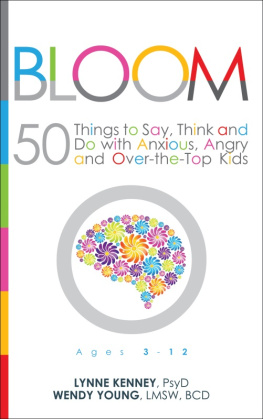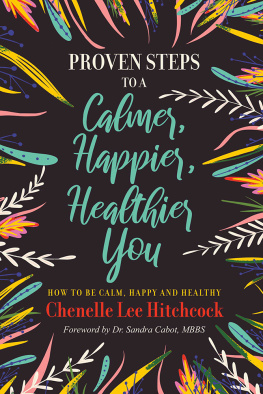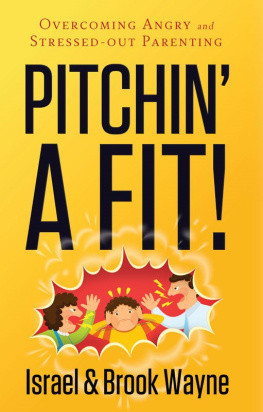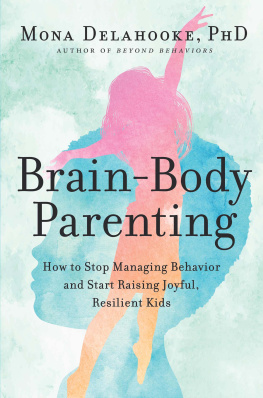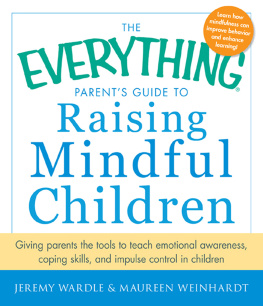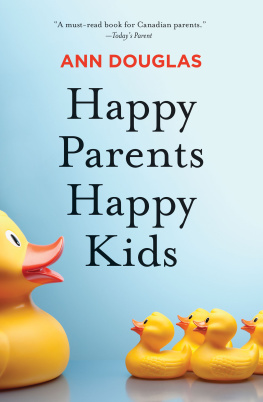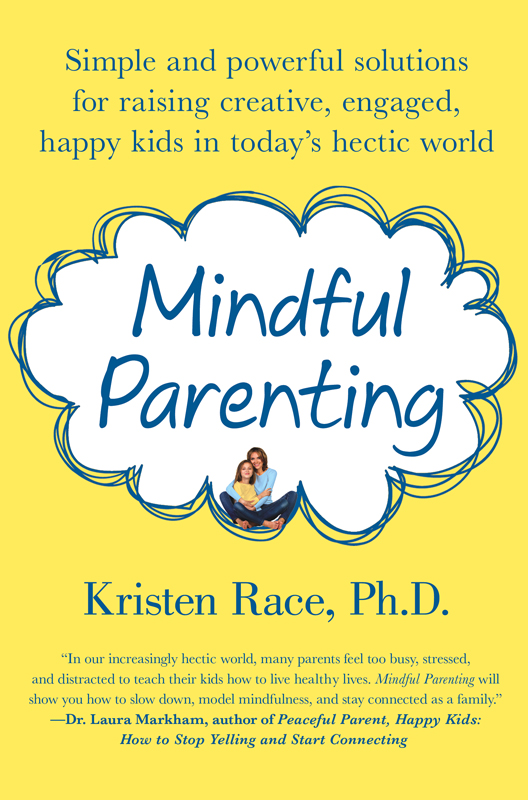
The author and publisher have provided this e-book to you for your personal use only. You may not make this e-book publicly available in any way. Copyright infringement is against the law. If you believe the copy of this e-book you are reading infringes on the authors copyright, please notify the publisher at: us.macmillanusa.com/piracy.
This book is dedicated to Macy & Charlie
I am forever grateful for your hugs, your kisses, and your smiling faces.
Thank you for always reminding me of the
exquisiteness of the present moment.
CONTENTS
PART I
Todays Family
INTRODUCTION
When Everything You Know About Parenting Goes Out the Window
Remember when lifes biggest stress was deciding where to meet friends for dinner or what to wear on Friday night? Remember when having fun was foremost on your agenda? If youre anything like me, things have changed.
For me the change came at around the age of twenty-eight. After deciding it was time to do more with my life than be the eternal ski bum, I got married, went to graduate school, had a beautiful baby girl, and then landed the perfect job in Denver. I was hired as the director of counseling services by a top-notch independent school that ran pre-K through twelfth grade. It was demanding, particularly as I tried to balance a full-time job with being a new mom and finishing my doctorate.
Things got even more interesting when I found out baby number two was on the way. With the clock running out, the pressure was on for me to finish my dissertation (when I wasnt at work) while still spending time with my family. And I had only six months before my second child was born. Call it some strong nesting instinct, but I also decided that it was the perfect time to remodel my house!
Believing I could handle anything if I set my mind to it, I managed to defend my dissertation and graduate one month before my son arrived. The house was finished and looked beautiful; my job was demanding but rewarding; my daughter loved her child care center; and I was still happily married.
As many of you know, it is amazing what your mind and body can do when youre under the gun. It was stress that drove me to accomplish what I did: to be the perfect mom, to have the perfect career, and to create the perfect life for my family. However, I had no idea what kind of toll operating in this state eventually takes on the human body.
About two months after my son, Charlie, was born, I began to realize that something was wrong. Even though Id completed my degree and was on maternity leave, I just didnt feel right. I attributed my intense feeling of fatigue to managing a newborn and a toddlercause enough!but when I woke up one morning covered in hives, I realized I had more than new-mom fatigue. Then I developed joint inflammation. It started in my neck and spread to my hips, knees, and wrists. I could barely make it through the day with my kids, and when my husband walked in the door each evening, I would retreat to our bedroom for the rest of the night.
After months of tests, tinkering with medication, and misdiagnosis, I found the answer: A careful doctor finally figured out that I had microscopic colitis, an autoimmune disease that affects the way the body absorbs nutrients. The stress I was experiencing had completely depleted my immune system, causing severe inflammation to my digestive system and throughout my body.
We live in a world where we expect perfection, especially from ourselves. I was determined to be the perfect mom, the perfect wife; to have the perfect house and the perfect job. And my desire to be perfect came with serious consequences. I had pushed myself to the breaking point, and it seriously affected my health and my emotional well being. This was a huge reality check for me. I knew how I wanted to feel, but in order to get there, I would need an overhaul of my lifestyle and my mentality. Something had to change.
The Price of Perfection
In my career I have worked at two schools at opposite ends of the socioeconomic spectrum: the well-off independent school just mentioned and an elementary school in a high-needs area of northwest Denver, where 95 percent of the population received a free or reduced-price lunch. At the school in northwest Denver, I vividly recall watching a young boy, Jos, smuggle pieces of fruit from the cafeteria into his pocket to bring home to his hungry three-year-old brother. At the well-off school, I recall a father walking into my office with his kindergartner and declaring that she would be attending Harvard !
When I first began my career, I believed that educating kids like Jos was the kind of work I wanted to do: helping those who needed it most. At the time, I equated socioeconomic status with needthat is, poorer kids needed more support. Yet at the independent school, it didnt take long for me to recognize the mental and emotional struggles the students there were facing. Just as kids in the high-need school had their own pressures and issues, the students at the independent school were some of the most anxious, stressed, depressed, and inattentive kids with whom I had ever worked. While academically they might have been achieving at a higher level, from an emotional standpoint they were no better off than Jos, who was uncertain where his next meal was coming from. How could this be?
Simply put, the well-off school was a pressure cooker. My husband was a teacher at the same school, and while we both thought it one of the best educational institutions in the state, we wondered, would it be the right place for our own kids? Could they handle the academic rigor? The social demands? Did we want them to struggle each evening with the hours of homework? Would they be happy there?
From that point on, we began to question whether Denver was the right place for us to raise a family. Like many families in big urban environments, we felt that we were in a rat race. My health issues were having a significant impact on our day-to-day life, but we also spent hours fighting traffic, racing from one activity to the next, caught in constant conversations about making sure our kids were in all the right activitiesand they werent even in kindergarten yet!
On most weekends, we would escape to our mountain getaway in search of a simpler life totally off the grid. But the weekends went by too quickly, and it wasnt much fun spending all our free time packing and unpacking for the trip with two kids under age three. So we decided to take the plunge and move back to Steamboat Springs, Colorado, the perfect small town in which to raise our family.
Changing Zip Codes Doesnt Change Everything
Before we moved, we pictured evenings spent watching sunsets, weekends camping, and our kids riding their bikes to school every day. A simpler life. Guess what? Even in small towns life gets crazy. Even in small towns you have a million activities to choose from. Even in small towns you overschedule, and youre expected to be readily accessible by phone, text, and e-mail. You still struggle to find balance, and you still have to make money. Even in small towns people get stressed out.
A few months after our move I realized that I had been trying to set up the perfect stress-free life for myself and my family from the outside . I had thought if I set up the perfect external environmentthe right marriage, the right house, the right school, in the right townwe would be able to live the happy, stress-free life we were seeking.
But there is only so much you can control from the outside. No matter where you are, there will always be stressors, and if you dont have the tools on the inside to manage the stressors in your life, your external environment becomes irrelevant. At the high-needs public school where I worked, those kids who possessed internalized tools to handle stress and adversity did well, despite living in a tough neighborhood. At the well-off independent school, it didnt matter how swank their houses or impressive their parents jobs; kids who didnt have the internal tools to manage stress suffered, sometimes a great deal.


